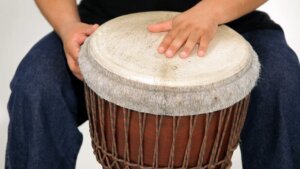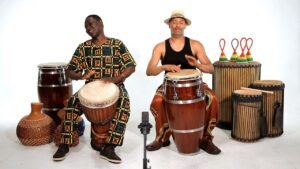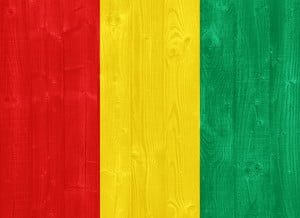Where in Africa is Nigeria? Geography, Culture, and More
Where in Africa is Nigeria? Nigeria is a country of immense geographical, cultural, and economic significance in Africa. Positioned in West Africa, it serves as a vital hub for trade, politics, and culture in the region. For those curious about where in Africa is Nigeria, it is strategically located along the Gulf of Guinea in the Atlantic Ocean, bordered by Niger to the north, Chad to the northeast, Cameroon to the east, and Benin to the west. These borders, combined with its vast coastline, contribute to Nigeria’s unique role as a gateway between the Sahel, Central Africa, and the coastal nations of West Africa.
Geographical Importance of Nigeria
Nigeria’s diverse geography is one of its defining features, with landscapes that range from arid savannas in the north to lush rainforests in the south. Its geographical positioning has fostered its rise as a significant economic and cultural hub within Africa. Key Natural Features 1. The Niger River and Niger Delta: - The Niger River is one of Africa’s most important waterways, flowing through Nigeria before emptying into the Atlantic Ocean. It is vital for agriculture, transportation, and fishing. - The Niger Delta, one of the largest wetlands in the world, is the epicenter of Nigeria’s oil production, making it an economic lifeline for the country. 2. Lake Chad: - Shared with Chad, Niger, and Cameroon, this shrinking lake has historically been a critical source of water and livelihoods for communities in Nigeria’s northeast. 3. Plateaus and Highlands: - The Jos Plateau in central Nigeria is a rich mining and agricultural zone, while the Mandara Mountains along the eastern border with Cameroon boast unique biodiversity and cultural heritage. 4. Extensive Coastline: - Stretching over 850 kilometers along the Gulf of Guinea, Nigeria’s coastline hosts bustling ports like Lagos and Port Harcourt, crucial for international trade and oil exportation.Where in Africa is Nigeria in the Context of West Africa?
Located centrally in West Africa, Nigeria shares cultural and historical ties with neighboring nations, many of which were part of ancient trade routes. The country’s position also makes it a key member of the Economic Community of West African States (ECOWAS), promoting regional trade and cooperation among its 15-member countries. Significance of Nigeria’s Location: - Nigeria acts as a cultural bridge between the predominantly Islamic Sahelian countries to the north and the coastal, Christian-majority nations to the south. - Its population of over 200 million people, the largest in Africa, provides a massive workforce and consumer market, giving it unparalleled influence in African trade, politics, and culture.Cultural Diversity of Nigeria
Nigeria’s cultural richness stems from its status as a melting pot of ethnic groups, languages, and traditions. With over 250 ethnic groups and more than 500 languages, it is one of the most culturally diverse countries in the world. This diversity is evident in its vibrant festivals, art, music, and cuisine. Major Ethnic Groups and Their Contributions 1. Hausa-Fulani (Northern Nigeria): - The Hausa-Fulani dominate northern Nigeria and are known for their rich Islamic traditions and long-standing involvement in trade and agriculture. The annual Durbar Festival showcases their equestrian culture and historical legacy. 2. Yoruba (South West Nigeria): - The Yoruba people are celebrated for their contributions to art, religion, and philosophy. Cities like Ile-Ife and Ibadan are historical and cultural landmarks, while Lagos, a Yoruba city, is Nigeria’s economic hub. 3. Igbo (South East Nigeria): - Known for their entrepreneurial spirit, the Igbo people have excelled in commerce and craftsmanship. Their vibrant festivals, such as the New Yam Festival, honor their agricultural heritage. 4. Ijaw and Other Minority Groups (South South Nigeria): - Indigenous to the oil-rich Niger Delta, these groups have a rich fishing culture and folklore. Their unique languages and traditions reflect their connection to the waterways of the Delta.
Nigeria’s Economy: Africa’s Giant
Nigeria boasts the largest economy in Africa, driven by its vast natural resources, industrial base, and burgeoning tech industry. The country’s economic structure is diversified, though oil remains its main export earner. Key Economic Sectors 1. Oil and Gas: - Nigeria is the largest oil producer in Africa and a founding member of OPEC. The oil-rich Niger Delta generates significant revenue, though environmental degradation in the region has prompted calls for diversification. 2. Agriculture: - Over 70% of Nigeria’s population is engaged in agriculture, making it a cornerstone of the economy. Major crops include cassava, maize, yam, cocoa, and rubber. - Livestock and fisheries also contribute to food security and exports. 3. Technology and Innovation: - Nigeria is a rising tech hub, often called the "Silicon Valley of Africa." Lagos and Abuja host numerous startups, including global leaders in fintech like Flutterwave, Paystack, and Interswitch. 4. Manufacturing and Industry: - The industrial sector includes cement, textiles, automotive production, and food processing. The Dangote Group, led by Africa’s richest man, Aliko Dangote, is a global leader in cement and refinery industries. 5. Trade and Services: - Lagos is the commercial engine of Nigeria, with its ports facilitating international trade. The city is also a center for banking, telecommunications, and retail industries. Tourism and Heritage Nigeria’s rich natural and cultural heritage makes it a promising destination for tourism. Its attractions range from wildlife reserves to ancient artifacts and lively festivals. Key Tourist Attractions 1. Wildlife and Natural Sites: - Yankari National Park: A premier wildlife sanctuary known for elephants and hot springs. - Olumo Rock: A historical site in Ogun State with panoramic views and caves used as shelters during ancient wars. 2. Cultural and Historical Landmarks: - The Benin Bronzes: Renowned for their intricate craftsmanship, these artifacts tell the story of the Benin Kingdom. - Osun-Osogbo Sacred Grove: A UNESCO World Heritage Site dedicated to the Yoruba goddess Osun. 3. Festivals and Events: - Calabar Carnival: Often called “Africa’s Biggest Street Party,” it draws international visitors for its vibrant parades and performances. - Lagos International Jazz Festival: Showcasing local and international talent, it celebrates Nigeria’s contributions to global music. Conclusion Nigeria’s location in West Africa places it at a crossroads of trade, culture, and politics, answering the question of where in Africa is Nigeria with resounding significance. Its diverse regions, thriving economy, and vibrant cultural heritage make it a cornerstone of the African continent. From its bustling cities like Lagos to its ancient traditions and natural landmarks, Nigeria embodies the spirit of a nation with immense potential and influence. FAQs about Nigeria, its location, culture, and economy, incorporating the keyword "where in Africa is Nigeria": 1. Where in Africa is Nigeria located? Nigeria is in West Africa, bordered by Niger, Chad, Cameroon, Benin, and the Atlantic Ocean to the south. 2. Why is Nigeria significant in West Africa? Nigeria is the most populous country in Africa and has the largest economy, making it a regional powerhouse. 3. What countries share borders with Nigeria? Nigeria shares borders with Niger to the north, Chad to the northeast, Cameroon to the east, and Benin to the west. 4. Where in Africa is Nigeria’s Gulf of Guinea coastline? Nigeria’s coastline lies along the Gulf of Guinea in the Atlantic Ocean, stretching over 850 kilometers. 5. What is Nigeria known for? Nigeria is known for its cultural diversity, Nollywood film industry, Afrobeats music, and oil-rich economy. 6. What regions make up Nigeria? Nigeria is divided into six geopolitical zones: North Central, North East, North West, South East, South South, and South West. 7. What is the significance of the Niger River in Nigeria? The Niger River, one of Africa's major rivers, flows through Nigeria and is a key resource for agriculture, fishing, and transportation. 8. Where in Africa is Nigeria’s largest city located? Nigeria’s largest city, Lagos, is located in the South West region, along the Gulf of Guinea. 9. What languages are spoken in Nigeria? Nigeria has over 500 languages, with English as the official language and Hausa, Yoruba, and Igbo as major regional languages. 10. Why is Nigeria called the “Giant of Africa”? Nigeria is called the “Giant of Africa” because of its large population, abundant resources, and economic influence in Africa. 11. Where in Africa is Nigeria’s capital, Abuja? Abuja is located in Nigeria’s North Central region, a strategically chosen location for the country’s administrative capital. 12. What is Nigeria’s role in the African economy? Nigeria is Africa’s largest oil producer and has a diverse economy, including agriculture, technology, and manufacturing. 13. What makes Nigeria culturally unique? Nigeria’s diversity, with over 250 ethnic groups and vibrant festivals, makes it a cultural leader in Africa. 14. How does Nigeria contribute to global entertainment? Nigeria is home to Nollywood, the second-largest film industry by production volume, and globally popular Afrobeats music. 15. Where in Africa is Nigeria in terms of tourism? Nigeria offers rich tourism experiences with natural landmarks, wildlife parks, and UNESCO sites like the Osun-Osogbo Sacred Grove.
https://howtoplaythedjembedrums.com/where-in-africa-is-nigeria/

 B. Traditional Clothing and Attire
Traditional clothing in Africa reflects cultural identity and societal roles. Different regions and ethnic groups have distinct styles, fabrics, and colors that convey social status, marital status, and cultural affiliation. For example, the brightly colored kente cloth of the Ashanti people in Ghana symbolizes wealth and prestige, while the intricate beadwork of the
B. Traditional Clothing and Attire
Traditional clothing in Africa reflects cultural identity and societal roles. Different regions and ethnic groups have distinct styles, fabrics, and colors that convey social status, marital status, and cultural affiliation. For example, the brightly colored kente cloth of the Ashanti people in Ghana symbolizes wealth and prestige, while the intricate beadwork of the 
 V. Conclusion
In conclusion, African culture is a vibrant mosaic of traditions, languages, and practices that vary across the continent while sharing unifying values. Exploring things to know about African culture reveals its intricate rituals, expressive art forms, and cohesive social structures. By embracing this diversity, we foster global connections and cultivate respect for one of the world's most culturally rich regions.
V. Conclusion
In conclusion, African culture is a vibrant mosaic of traditions, languages, and practices that vary across the continent while sharing unifying values. Exploring things to know about African culture reveals its intricate rituals, expressive art forms, and cohesive social structures. By embracing this diversity, we foster global connections and cultivate respect for one of the world's most culturally rich regions.


 8. Festivals and Celebrations: Vibrant Expressions of
8. Festivals and Celebrations: Vibrant Expressions of  Frequently Asked Questions (FAQ)
1. What is the purpose of the "Facts About African Culture" initiative?
The "Facts About African Culture" initiative aims to educate and inform individuals about the rich and diverse
Frequently Asked Questions (FAQ)
1. What is the purpose of the "Facts About African Culture" initiative?
The "Facts About African Culture" initiative aims to educate and inform individuals about the rich and diverse 





